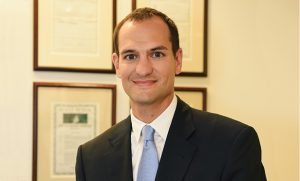 Josh Jeffries, principal, Arkin Youngentob
Josh Jeffries, principal, Arkin Youngentob
Josh Jeffries is a principal at Arkin Youngentob, which has been in business for more than half a century. The firm's services range from consulting on design, funding, underwriting and implementation of strategies to ongoing administration and communication.
Paul Wilson: How did you get your start in the benefits industry?
Straight out of college, I was with Northwestern Mutual and there was one guy in the office who always seemed less stressed than everyone else. I talked to him and he was in employee benefits. He explained that side of the business, and I decided that's where I belonged, because you're teaching people to spend their money more wisely.
I left and moved to D.C., where I started at a small practice. I kind of learned trial by fire—they basically gave me a phone and said “good luck.” I figured out that nonprofits value benefits over salary and that government contractors grow really quickly but often aren't prepared for the growth, so I focused on those two industries. After about five years, I was doing pretty well, and they offered me a partnership. I couldn't see a long-term path for myself there, so I decided to leave and start my own practice.
Related: Up-and-coming brokers and carriers: Where's the connection?
I was lucky because right across from our office was UnitedHealthcare's Mid-Atlantic office. They had a sales guy, Dave Notari, who later became the CEO for Innovation Health, the largest ACO in the country. He took me under his wing, and that was a big impetus for me to start my own practice.
So at 27, I started my first company, focusing on HRIS, HR consulting and self-funded health plans. I ran that for three years and in 2009, I met my current business partner, Stuart, through a mutual friend. They had a life insurance business that he took over from his father, but they also had a small benefits practice. He's a lawyer, MBA, CPA, so he knew that any legislative change means opportunity, and he was planning to double down in the benefits space. We decided to merge our practices in 2010. I started an MBA program at the exact same time, and when health care reform passed, I used it as the basis for my MBA.
We restructured in 2011 to become a fee-based, transparent, self-funded practice. Seven years later, benefits is 80 percent of our revenue.
PW: In what ways has your career path shaped your mindset as a broker?
Because I really had to grind from day one, that has instilled a work ethic in me that I'll carry through my entire life. And because I worked in a pretty traditional agency near the beginning of my career, it gave me a line of sight outside of that model. It showed me there's a different way.
I was lucky because I was exposed to self-funding way earlier in my career than most people. And meeting Stuart expanded my perception of the industry even further. He has a background not only as an insurance salesman but as an advisor; he was the quarterback who goes into a wealthy family and gets everyone on the same page to build a strategic plan. A lot of those core values are integrated into what we do today. We meet with prospects who say, “Let's talk insurance.” We tell them, “That's the last thing we'll talk about.” We're there to consult and be a trusted advisor. They're buying our intellectual capital, not our products.
PW: What does the word “disruption” mean to you?
Unrest. It makes me think that people are really starting to feel the pain of escalating costs in the industry and are searching for disruption. Health care/pharmacy and insurance are two of the top lobbies in America. To disrupt that industry is going to take a Herculean effort, but I think it's going to happen.
A lot of the technology that's out there today holds promise; that's why we're seeing a rush to vertical integration at some carriers, and consolidation efforts like those of Aetna and CVS, trying to localize their service model in communities. And Amazon, Berkshire and JP Morgan makes perfect sense to me.
Five years in the future, when half the workforce are gig employees, they won't be getting their insurance through their employer. I think large employers will always provide health care, but for companies under 200 employees, health care steals their focus, affects their profits and creates administrative burden. I know this is an unpopular belief from an advisor perspective, but I believe that small employers would be better served with a portable benefit platform that qualified workers can take with them from one employer to the next.
PW: How much attention do you pay to health reform and the ongoing single-payer debate?
I'm in D.C., so I pay close attention to it. I think a lot of people hear “single-payer” and they immediately jump left or right. To me, single-payer is a safety net, but the private market will still exist. In some ways, I think those platforms create a further divide between the haves and the have-nots, because the individuals who have higher incomes are going to buy better insurance, and the public plan will be left with everyone else.
You look at Canada, with 40 million people, and there are waits there for services. We have 350 million people, and not a lot of people want to be doctors these days. So I think there's a lot of systemic issues that need to be solved before people jump to the ideological arguments.
PW: Do you think anything will happen soon, or will it get kicked down the road?
I think the party lines will continue to divide to the extent where they won't be able to get anything moving forward on it. There's already a massive amount of investment going into the health care space and you're going to see American ingenuity and innovation disrupt the marketplace.
Direct primary care and similar trends focusing on the re-localization of health care will play a huge role. I mean, we all pay for these national networks, but the reality is that 95 percent of people go to care within 50 miles of their home. We're all paying for an infrastructure that we're starting to realize is not necessarily working that well.
PW: What are your favorite things about your job?
I would say the top thing is diversity. We have 165 clients in every industry known to man. We know their strategy, we know how they run their business, we know the structure of their business. One of the first questions I ask is “What's the structure of your business? C corp, S corp or LLC?” That information really ties us into the strategy of the business. I find it very energizing to take strategies from one industry and open them up to an employer in another where it could really help their business.
The other thing is improving people's lives. We meet with clients all the time whose advisor has moved them into high-deductible plans, shifted costs to employees, made the network narrow, reduced the formulary and put in more medical management. It's counterintuitive, but when we make the benefits better, people get better care. They don't avoid things and end up in high-cost situations.
PW: How can the industry do a better job of attracting young and innovative consultants?
If we can position ourselves as trusted advisors who are hired for our intellectual capital—no different than a doctor or a lawyer—then we will attract higher-caliber, younger people into the industry.
PW: Why is it a good career path for a young candidate?
There is no other industry where you have the same exposure to the business fabric of America. There are very few careers where you can have this level of impact, especially at a very young age. And the industry is changing so dramatically right now. You no longer start a prospecting meeting with “I've been in the industry for 30 years,” because that's not as meaningful today. There's a huge opportunity for talented, motivated people to leave a footprint on the industry.
PW: What are your sources of inspiration and innovation?
At the end of the day, my driving vision is securing the middle class in America. For some reason, we as a country accept the fact that carriers own every aspect of the care paradigm. They pool the money into the health plan and don't disclose any fees to the consumer. It's amazing to me. My overarching inspiration over the next 30 years will be to correct that issue. There's no reason that, as American consumers, 25 percent of our income is going to health care and we don't know the cost of that care when we receive it.
PW: Finish this sentence: The key to success in this industry going forward is…
Curiosity and innovation.
© 2025 ALM Global, LLC, All Rights Reserved. Request academic re-use from www.copyright.com. All other uses, submit a request to [email protected]. For more information visit Asset & Logo Licensing.







